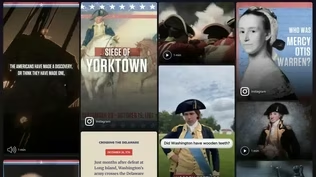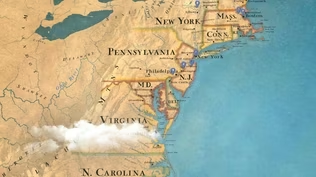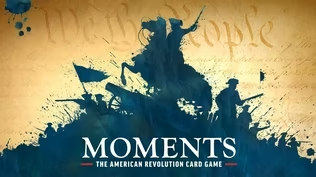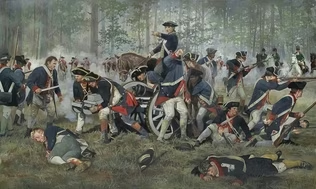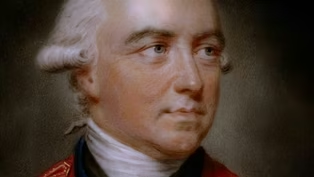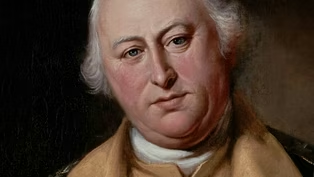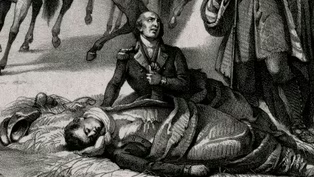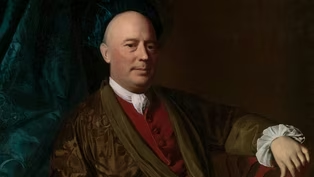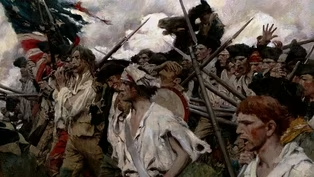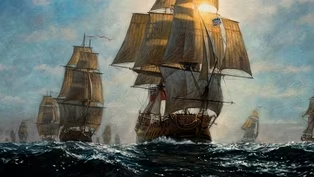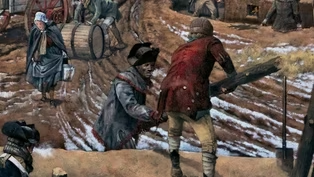
The Battle of Monmouth
Clip: Episode 5 | 8m 56sVideo has Closed Captions
The Continental Army engages the British in the last major battle in the North of the Revolution.
A solar eclipse plunges the colonies into darkness in June 1778 as the Continental Army mobilizes from Valley Forge to attack British supply chains. The two armies clash near Monmouth Court House in New Jersey in brutal summer heat. At the end of the battle, both sides are bloodied, yet both claim victory. The Battle of Monmouth will be the last major engagement of the war in the North.
Problems playing video? | Closed Captioning Feedback
Problems playing video? | Closed Captioning Feedback
Episodes presented in 4K UHD on supported devices. Corporate funding for THE AMERICAN REVOLUTION was provided by Bank of America. Major funding was provided by The Better Angels Society and...

The Battle of Monmouth
Clip: Episode 5 | 8m 56sVideo has Closed Captions
A solar eclipse plunges the colonies into darkness in June 1778 as the Continental Army mobilizes from Valley Forge to attack British supply chains. The two armies clash near Monmouth Court House in New Jersey in brutal summer heat. At the end of the battle, both sides are bloodied, yet both claim victory. The Battle of Monmouth will be the last major engagement of the war in the North.
Problems playing video? | Closed Captioning Feedback
How to Watch The American Revolution
The American Revolution is available to stream on pbs.org and the free PBS App, available on iPhone, Apple TV, Android TV, Android smartphones, Amazon Fire TV, Amazon Fire Tablet, Roku, Samsung Smart TV, and Vizio.
Buy Now
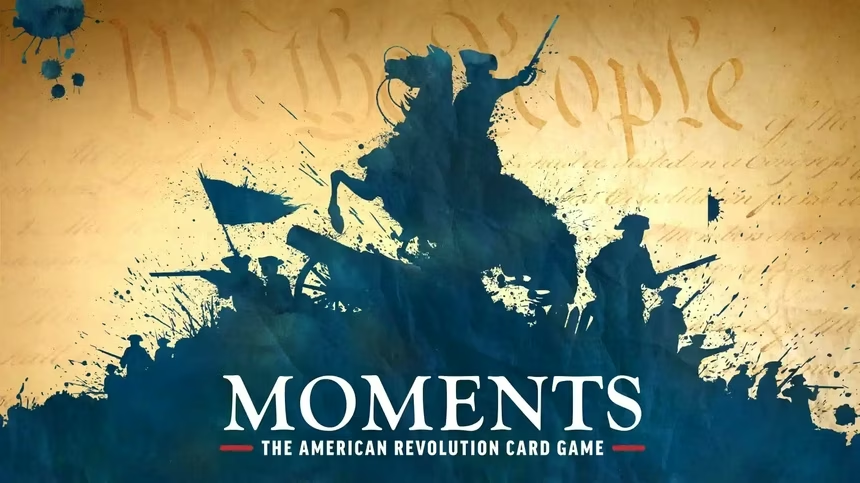
MOMENTS: The Revolutionary War Card Game
Use your knowledge of Revolutionary-era moments to build a timeline of real historical events.Providing Support for PBS.org
Learn Moreabout PBS online sponsorship♪ [Birds chirping] On the morning of June 24, 1778, Americans otherwise disconnected by the vastness of their continent witnessed an otherworldly phenomenon at roughly the same time as the moon eclipsed the sun.
♪ Indians and Spanish colonists in Mexico and Texas saw it first.
When it reached Spanish New Orleans and British Mobile, the flags of empire flew in sudden darkness for more than 4 minutes.
The total eclipse lasted even longer for the Muscogee Creeks on the Chattahoochee River and for the "Maroon" communities of self-emancipated former slaves hidden in the Great Dismal Swamp.
♪ When mid-morning darkness descended on the Virginia capital at Williamsburg, "Lightening buggs were seen as at Night."
♪ The same darkness briefly enveloped Washington's army as it followed the British into New Jersey.
"Had this happened upon such an occasion in "olden time," Private Joseph Plumb Martin remembered, "it would have been considered ominous, either of good or bad fortune, but we took no notice of it."
♪ Martin had been detached from his Connecticut regiment and assigned to join fast-moving light infantry with orders to follow the enemy closely enough to capture stragglers and welcome deserters.
The day after the eclipse, Clinton decided to head east towards Sandy Hook, a Loyalist stronghold from which royal transports could ferry his men to New York.
He merged his two divisions into one column, and, he recalled, hoping that "Mr.
Washington might possibly be induced to commit himself" to battle, "[I placed] the elite of my army between him and my [supply train]... to defend it from insult."
He put General Charles Cornwallis in charge of that force.
♪ At Hopewell, Washington convened a council of war.
General Nathanael Greene, back in the field, was eager for a fight.
Voice: If we suffer the enemy to pass through the Jerseys without attempting anything upon them, I think we shall ever regret it.
People expect something from us, and our strength demands it.
[Nathanael Greene] Narrator: But most commanders urged caution.
Major General Charles Lee-- Washington's second in command, captured two years before and only recently exchanged-- was especially adamant in his opposition.
Sending Americans against British regulars would be "criminal," he said, but when Washington decided to send forward 4,500 troops anyway, Lee insisted seniority required that he lead them.
If he weren't given command, he said, he would be "disgraced."
Washington relented and ordered Lee to follow Cornwallis' elite rearguard and look for an opportunity to attack.
♪ [Man saying commands] Narrator: The British left their encampment around Monmouth Court House well before dawn on Sunday, June 28th.
[Gunfire] By mid-morning, Lee's men had formed west of the British line, trying piecemeal to attack and dislodge Cornwallis' forces.
All their efforts proved futile.
[Shouting and gunfire] Narrator: As the Patriots struggled in the increasingly brutal heat, Clinton sent an entire division to reinforce Cornwallis.
More than 10,000 British, German, and Loyalist troops counterattacked.
Atkinson: Things go south in a hurry for the Americans.
Lee loses control, and the next thing you know, this American advance guard, the vanguard that's supposed to be attacking, is fleeing.
Lengel: They're confused.
They begin falling back, but then Washington appears.
The knowledge of his presence causes the retreat to stop instantaneously without even having said a word.
Those who witnessed this moment said that it was like a bolt of electricity shot through the forces once they realized that Washington was there.
Voice: His presence stopped the retreat.
His fine appearance on horseback, his calm courage gave him the air best calculated to excite enthusiasm.
He rode all along the lines amid the shouts of the soldiers, cheering them by his voice and example.
Marquis de Lafayette.
Lengel: Washington gives some orders.
The men get back into line... and they face down the British attack, and they don't break.
Man: Fire!
♪ [Men shouting commands] Narrator: General Steuben's training had paid off.
The British launched a series of assaults.
General Henry Clinton himself led one of them, sword in hand.
♪ Colonels Alexander Hamilton and Aaron Burr both had horses shot out from under them, but the Americans held.
Atkinson: Washington places his defenses in a way that stops the British assault.
He's got good ground for his artillery.
He's hammering the British.
[Men shouting] ♪ Narrator: The artillery duel continued for two hours.
Infantry on both sides sought whatever cover they could.
Voice: With the thermometer at 96, what could be done in a hot pine barren loaded with everything that the poor soldier carries?
It breaks my heart that I was obliged under those cruel circumstances to attempt it.
General Henry Clinton.
♪ Narrator: Finally, at around 3:45, Clinton ordered a stop to the firing.
With his supply train now well on its way towards Sandy Hook and safety, he reluctantly began to withdraw his exhausted troops.
Washington's men were worn out, too.
The heat, Joseph Plumb Martin remembered, was like "the mouth of [an]...oven."
[Insect buzzing] Voice: It was generally understood the battle was to be renewed at the dawn of day, but at the dawn of day, I heard the shout of victory-- "The British are gone."
Dr.
William Read.
♪ Narrator: The Battle of Monmouth had left some 362 of Washington's men and 411 of Clinton's dead, wounded, or missing.
Corpses, swollen and blackening in the heat, sprawled everywhere.
Both sides claimed victory.
♪ Clinton's column reached Sandy Hook without serious interruption and embarked for Staten Island.
His objective was to get his army to New York, and he had done so... ♪ but when the fighting ended, Washington's men held the field.
"It is glorious for America," a New Jersey colonel wrote his wife.
At least one British officer admitted his army had endured "a handsome flogging."
Although there would be fierce fighting and many skirmishes in New England and the Mid-Atlantic states, Monmouth would be the last major battle fought in the North during the American Revolution... ♪ and it would be more than 3 years before George Washington would personally lead his troops into battle again.
♪ Serena Zabin: What he learns over the course of the war is that there are other ways to perform his leadership that's not actually by doing something big and bold but that waiting and holding back and containment can also be a way of showing his strength.
Britain and the Southern Strategy
Video has Closed Captions
Clip: Ep5 | 4m | When it becomes clear that the British won’t win in New England, they set their sights on the South. (4m)
The British Siege of Charleston
Video has Closed Captions
Clip: Ep5 | 4m 44s | The British surround and siege Charleston, South Carolina, one of the largest cities in America. (4m 44s)
Video has Closed Captions
Clip: Ep5 | 5m 56s | The American Revolution has spilled into a global war, but the United States hangs on by a thread. (5m 56s)
Financing the American Revolution
Video has Closed Captions
Clip: Ep5 | 2m 59s | The economic realities of the war start to settle in for both the Americans and the British. (2m 59s)
Preview: The Soul of All America
Video has Closed Captions
Preview: Ep5 | 30s | The war drags on and moves to new theaters: at sea, in Indian Country, and in the South. (30s)
Spain Joins the American Revolution Against the British
Video has Closed Captions
Clip: Ep5 | 5m 43s | Spain joins the war, but not as an ally of American independence – as an enemy of Britain. (5m 43s)
Winter at Valley Forge: Hardship & Desperation
Video has Closed Captions
Clip: Ep5 | 4m 26s | The Continental Army threatens to unravel while suffering harsh winter conditions at Valley Forge. (4m 26s)
Providing Support for PBS.org
Learn Moreabout PBS online sponsorshipSupport for PBS provided by:
Episodes presented in 4K UHD on supported devices. Corporate funding for THE AMERICAN REVOLUTION was provided by Bank of America. Major funding was provided by The Better Angels Society and...

